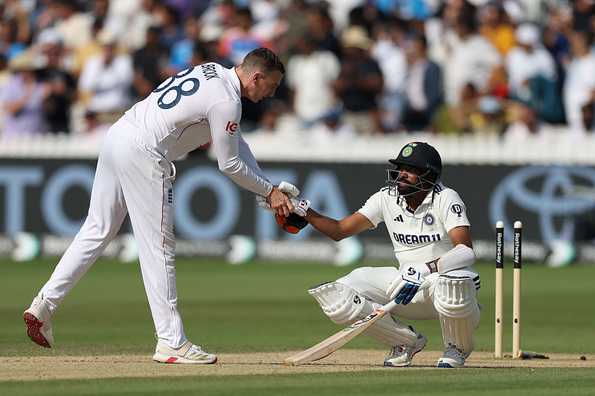Mohammed Siraj admitted it took him time to come to terms with the way things ended at Lord's, a slow-burn Test that appeared lost on the final day, then teased Indian dreams, and then shut the door in the cruelest fashion. India's No. 11 had battled for 64 minutes and 29 deliveries that day alongside Ravindra Jadeja, their last-wicket partnership giving India a glimmer of hope. Then came the heartbreak: a solid forward defence against Shoaib Bashir, perfectly middled, only for the ball, kissed with overspin, to roll back and disturb the stumps.
'Getting that close and losing was heartbreaking' - Mohammed Siraj

In that instant, the dream dissolved. Siraj stood hunched over his bat, the image now etched as one of the defining visuals of the series, not just for its pathos, but for what it represented: resistance, vulnerability, and the fine margins that separate triumph from despair.
"To get out after middling the ball..." Siraj said. "The way we were batting, me and Jaddu bhai, it never felt like I could get out. I had this much confidence from batting there that I could only get out if I made a mistake. Unfortunately, I got out even after middling the ball. That was heartbreaking.
"At one point, it looked like we would lose by 80 runs. Then we fought hard. We even took it past Tea. That hurts more. Had we lost by 80, it would have been fine. To get that close and lose is heartbreaking. But after a while I told myself the series is not yet over. There are still two more Tests. These matches should be fun."
It's that dust-yourself-off-and-get-back-to-work attitude that also defines Siraj the bowler. He has long made peace with a truth fast bowlers often learn the hard way: effort and excellence don't always translate to wickets. That understanding sustained him through the Australia tour, echoed in his spell at Leeds, and only briefly relented with his six-wicket burst at Edgbaston. At Lord's, he was at his probing best, particularly against Joe Root, but was denied again, this time by the finest of margins and an Umpire's Call.
"I have been bowling very well, but luck hasn't been a little on my side," he said. "As a bowler, I of course want wickets every time I bowl well, but you have to tell yourself that if not in this match, you will get it in the next. Upar wala bhi dekh raha hai [The man upstairs is watching]. If he has brought me this far, he will take me ahead as well.
"I can't get irritated if I don't get wickets. Even in the last match, it was so frustrating when I beat Joe Root, drew edges, did everything, but the only thing missing was his wicket. But I have to tell myself to keep it simple and keep bowling good balls, and the results will come."
That mental recalibration, Siraj says, is what keeps him from straying. No chasing wickets with fuller balls, no breaking patterns out of impatience. In the end, pressure is a currency, even if the reward is cashed in by someone else. "If I go searching, I will leak runs," he said. "My plan is to stay consistent and keep hitting the good areas. If I have to get wickets, I will get them from there. If I end up just building pressure instead, it could get us wickets from the opposite end. So at that time the mind doesn't wander to my wickets."
Meanwhile, the larger conversation around workload has mostly centred around Jasprit Bumrah this series, but Siraj's own load hasn't been light. He has played 24 of India's last 27 Tests and already bowled 109 overs in this series alone. Yet there's no talk of fatigue, only faith, and the hunger to keep going. "I am thankful God has kept me healthy, touch wood," he said.
"Workload is one thing, and it goes in the book that Siraj has bowled this many overs, but for me, it is just another opportunity. I want to do well and want to help win matches for the country. I want to play as many matches as I can, and all I want is to give my 100 percent. That when I go to bed at night, I shouldn't feel I could have done more, no matter the results."





